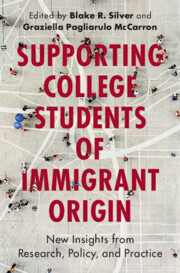Book contents
- Supporting College Students of Immigrant Origin
- Supporting College Students of Immigrant Origin
- Copyright page
- Dedication
- Contents
- Figures
- Tables
- Contributors
- Foreword
- Part I Beginnings
- Part II Experiences
- Part III Institutional Arrangements
- Chapter 12 Student Success Considerations for First-generation, Working-class Latinx College Students
- Chapter 13 Honoring Immigrant College Students’ Funds of Knowledge through Appreciative Advising
- Chapter 14 How Institutional Policies and Practices Impact Black Immigrant College Students’ Experiences
- Chapter 15 Understanding the Personal Support Networks of First-generation College Students from Immigrant Backgrounds
- Chapter 16 Institutional Responsibility for International Student Well-being and Belongingness
- Part IV Looking Forward
- Epilogue
- Index
- References
Chapter 15 - Understanding the Personal Support Networks of First-generation College Students from Immigrant Backgrounds
from Part III - Institutional Arrangements
Published online by Cambridge University Press: 16 May 2024
- Supporting College Students of Immigrant Origin
- Supporting College Students of Immigrant Origin
- Copyright page
- Dedication
- Contents
- Figures
- Tables
- Contributors
- Foreword
- Part I Beginnings
- Part II Experiences
- Part III Institutional Arrangements
- Chapter 12 Student Success Considerations for First-generation, Working-class Latinx College Students
- Chapter 13 Honoring Immigrant College Students’ Funds of Knowledge through Appreciative Advising
- Chapter 14 How Institutional Policies and Practices Impact Black Immigrant College Students’ Experiences
- Chapter 15 Understanding the Personal Support Networks of First-generation College Students from Immigrant Backgrounds
- Chapter 16 Institutional Responsibility for International Student Well-being and Belongingness
- Part IV Looking Forward
- Epilogue
- Index
- References
Summary
Building relationships and utilizing support networks on and off campus as a first-generation college student (FGCS) from an immigrant family is critical to achieving postsecondary success. This chapter explores the personal support networks and help-seeking preferences of immigrant-origin FGCSs as part of a three-year longitudinal mixed-methods study with FGCSs at four public Hispanic-serving institutions in California. We employ social network analysis methods using survey and interview data to explore the types of relationships twelve Latinx immigrant-origin FGCSs have that provide them support in college. To guide our analysis, we use Yosso’s (2005) model of community cultural wealth. Findings reveal the significance and specific types of support provided by parents, siblings, extended family, friends and peers, co-workers, and college advisors. These findings promote an expansive view of familial support, with many connections providing encouragement, motivation, and tangible support and serving as brokers to college-based resources. Recognizing these relationships can facilitate the modification of student services and programming to help FGCSs enroll and persist in college.
Keywords
Information
- Type
- Chapter
- Information
- Supporting College Students of Immigrant OriginNew Insights from Research, Policy, and Practice, pp. 310 - 331Publisher: Cambridge University PressPrint publication year: 2024
